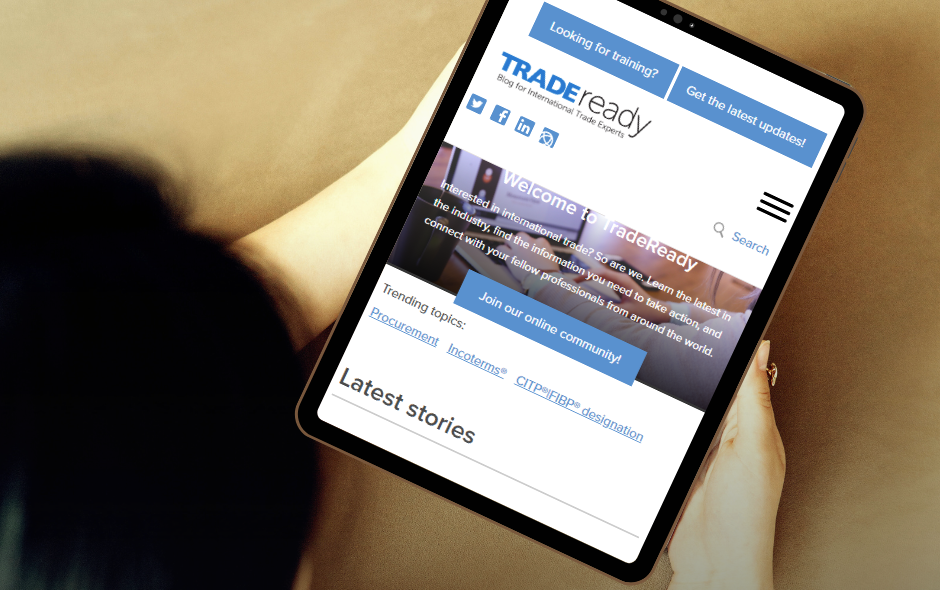
In business, establishing an edge over the competition is the holy grail. Once you have it, sales and success are sure to follow. But actually achieving this minor miracle, especially in a new-to-you international market, requires a significant investment in research, marketing and product development.
Since this is what business all strive for when they go global, and there is no magic formula for success, we thought it was the perfect subject for this month’s #TradeElite Twitter chat.
FITT’s monthly Twitter chats bring together an expert panel – the “#TradeElite”, typically with diverse geographical, sector and focus backgrounds, and ask them to answer questions about the topics that matter most to you, out there making trade happen. Though we feature a panel, we open every chat to participation from all. And through these interactive chats a wave of useful insights and advice pours in and we share it with you here.
Enjoy, and join us next month (scroll to the bottom of the article for details)!
Panelists:
Rob Ward (@1robward) Co-founder of Grocery Accelerator Ltd, the UK’s leading provider of investment funding, coaching and mentoring for early stage FMCG products in the food & drink grocery market, based out of Norfolk, UK.
Simon Slyper (@SimonTradeBuzz) International Trade and Compliance Specialist for Amscan, the largest designer, manufacturer and distributor of decorated party goods and party accessories in the world, based in New York City, USA.
Kevin Sullivan (@KPSully448) Regional Account Manager / Food & Beverage Sector Lead at Export Development Canada, based in the Greater Toronto Area, CA
Audrey Ross (@tresAudrey) Logistics & Customs Specialist at Orchard International Inc, a full-service provider of turnkey solutions and sourcing for private label cosmetics, beauty, and bath products, based in Toronto, CA
Here’s a good place to start: What does it mean to have a competitive edge within a market?
A1. @FITTNews It means you are the leader / hold the market share / have the most customers / have the most expertise in that market. #TradeElite
— audrey ross (@tresAudrey) May 24, 2018
A1. Being first to market is a way to gain competitive edge. Innovation & strategy play a big role in being first product to market. #tradeelite
— audrey ross (@tresAudrey) May 24, 2018
What are some strategies that your business can take to develop close relationships with local businesses in the new market you are trying to enter?
A1 first learn their etiquette: Body language, customs, manners…
— Rob Ward (@1robward) May 24, 2018
A1 eating habits, routines, flavour preferences, timing…
— Rob Ward (@1robward) May 24, 2018
A1: Do any of your existing customers have subsidiaries in this new market? If so, can you leverage your relationship and track record with this customer to ask them for a shot at quoting business in this new local market?
— Kevin Sullivan (@KPSully448) May 24, 2018
A1 @SimonTradeBuzz Building relationships often means One on Ones. Get your passport ready! Connecting on social media, at tradeshows and maintaining communication build up a relationship. #tradeelite
— audrey ross (@tresAudrey) May 24, 2018
What legal strategies and concerns must your business take into account when entering a new market?
A2. You want to get an expert local representative. THis is one of those areas you cannot skimp on. Rules are very different in different markets. Save yourself a mess and get an expert. That said, there is a lot of research you can do up front for free #TradeElite https://t.co/qNTfBeocI8
— audrey ross (@tresAudrey) May 24, 2018
For UK & EU, significant homework needed to be clear about on-pack claims. Also worth considering joining protocols if you’re compliant https://t.co/N8xMtPRHki
— Rob Ward (@1robward) May 24, 2018
A1: Take advantage of consultations with @TCS_SDC and @ExportDevCanada trade advisory teams to source information at free of charge before finally consulting with your own legal team.
— Kevin Sullivan (@KPSully448) May 24, 2018
True! @ExportDevCanada & @TCS_SDC are SO helpful to Cdn biz! @USTradeRep can help out American biz. UK has some amazing chamber of commerces, like @NEEChamberJac plus @tradegovuk! Every country wants to facilitate business! #tradeelite https://t.co/ImwdASGAxF
— audrey ross (@tresAudrey) May 24, 2018
the best legal strategy is knowing and learning the rules of the game of the target market, never step in before analyzing the risks. It takes time but not following a structured strategy may be detrimental to your success. Ask for advice an incorporate it into your X’s BP
— Adriana Carrillo (@acarrillo2016) May 24, 2018
We’ve got “do your homework” & “Due diligence” & “do the math” on the board in this chat already. What if you don’t want to do stuff to go global? Hire a CITP who’s been trained & qualified by @FITTNews #TradeElite
— audrey ross (@tresAudrey) May 24, 2018
Is it necessary to design new products/services in a new market?
A3: Yes and no. It depends on the product/service. @McDonalds, for example, does a great job of not necessarily inventing an entirely new product, but adjusting it to meet local tastes. Some markets may call for radical change, but market testing is essential #TradeElite
— Simon Slyper (@SimonTradeBuzz) May 24, 2018
A3: what @SimonTradeBuzz said. In many cases you may realize terrific returns with existing product offering. Of course, budget for and be prepared to pivot to adapt to local market. “Test orders” using online platforms in markets like China work well for gaining a pulse
— Kevin Sullivan (@KPSully448) May 24, 2018
A3. It is not necessary. It IS necessary to ensure your product / service is compliant to meet product safety standards, or local regulations, is usable for a customer unfamiliar with the product. #tradeelite
— audrey ross (@tresAudrey) May 24, 2018
How important is speed to market when it comes to being competitive?
Speed to #market is very important, even critical in many instances. There are narrow windows of opportunity for market success depending on the product or service. Cost/benefit needs to be weighed. @TradeElite
— Simon Slyper (@SimonTradeBuzz) May 24, 2018
Being #competitive depends on how different you are from the others, how well you fit in the needs of the target consumers. Innovations are just popping up every day make sure to differentiate as much possible to allow you not to have to speed on
— Adriana Carrillo (@acarrillo2016) May 24, 2018
A4. If you are trying to be 1st- then it’s important. Try not to lose sight of what may be needed post-launch. If you don’t have cust service or supply chain or delivery established you could ruin all of your hard work. (Case Study: Target Canada) #tradeelite
— audrey ross (@tresAudrey) May 24, 2018
What about marketing, messaging and local endorsements? How important are these and what are some success strategies?
A5: Local endorsements are important, but conduct #duediligence on your potential local partner. What is their reputation in the local market? #YouTube #influencers in local markets may be a powerful tool to attract buzz for your product/service. #TradeElite
— Simon Slyper (@SimonTradeBuzz) May 24, 2018
key ingredient – how well you mix the local culture flavour with your own marketing flavour. Hiring a local marketing agency may also be the right step
— Adriana Carrillo (@acarrillo2016) May 24, 2018
A5. Another area where research & local connections are key. Culture has a huge influence on what we find funny / appropriate / catchy what works in one market & one language may not be well received in another. #tradeelite
— audrey ross (@tresAudrey) May 24, 2018
A5. Work with locals on your marketing / advertising strategies. When hiring people look for recommendations & get them to present actual numbers. Have they done new product launches? new brands? #tradeelite
— audrey ross (@tresAudrey) May 24, 2018
Do you need to have boots on the ground to compete in an international market?
A6: Not necessarily. You may even be able to leverage contacts in your local market who are already well entrenched in your target market. Partner with these sourcing companies to help you build a beachhead and penetrate the market(s). Expand organically from there.
— Kevin Sullivan (@KPSully448) May 24, 2018
I will always recomend having a high level of collaborative relationships in the target market. Join local chambers of commerce and have a presence in their activities.
— Adriana Carrillo (@acarrillo2016) May 24, 2018
A6. Not really in the age of the internet but if you want someone executing your vision you may need to establish a presence. Or at least the perception that you are simply a flight away & can & will be there to ensure things are running well. #tradeelite
— audrey ross (@tresAudrey) May 24, 2018
Need to be the right boots! Ones that truly listen and learn, yes. Ones that kick… get knocked out! https://t.co/hb0H5UmD6S
— Rob Ward (@1robward) May 24, 2018
What are some warning signs that you may have trouble competing in a certain market?
High competition of similar products and lack of differentiation. Also, no actual bilateral protocols for new products accessing new markets
— Adriana Carrillo (@acarrillo2016) May 24, 2018
A7. If you don’t see a lot of foreign brands being successful or if you come across regulations (or lack of regulations) that leave you open to IP risk or investment risk. #tradeelite
— audrey ross (@tresAudrey) May 24, 2018
A7. There is a fine line of governing to protect your national interests & being unreasonably unfair to foreign biz. Often markets w/ limited infrastructure or inflated bureaucracy can be unfriendly. There are still ways to succeed, it’s just a more effort. #tradeelite
— audrey ross (@tresAudrey) May 24, 2018
Read the rest of the chat and join future discussions by following the #TradeElite hashtag. And stay tuned for the next #TradeElite chat, coming up Thursday, June 14 at 2:30-3:30PM ET, and if you haven’t yet, join us on Twitter at @FITTNews.






disqus comments